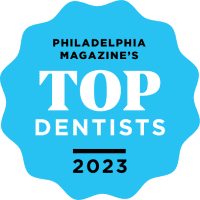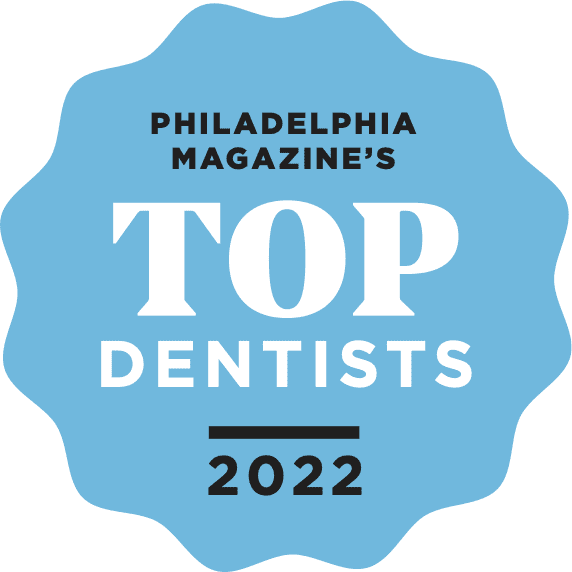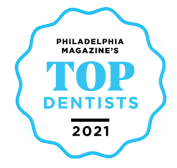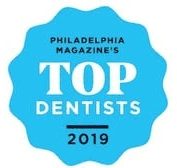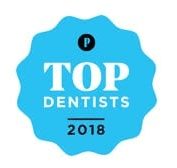Do you suffer from frequent headaches? Does your jaw hurt, click or feel tired?
Treating TMJ in Philadelphia, PA
The temporomandibular joint (TMJ) connects the jawbone to the skull. When pain develops around this joint and the surrounding muscles become tense, it can be the result of a TMJ disorder (TMD). There are millions of diagnosed cases of TMJ dysfunction in the U.S. each year. If left untreated, TMJ disorders can cause serious damage to the jaw joint, teeth and surrounding tissues.
Sometimes, you can alleviate TMJ pain with lifestyle changes and relaxation techniques for reducing tension in the jaw muscles. Exercising your jaw and neck area can also be helpful.
However, if pain persists, an evaluation with Dr. Shulman is recommended to avoid the development of more complex problems or permanent damage. Dr. Drew Shulman is a top restorative dentist in Northeast Philadelphia with extensive experience treating TMJ symptoms.

Common Signs of TMJ
There are several signs of TMJ to look out for. Some common signs may include:
- Chronic migraines
- Chronic fatigue
- Jaw pain
- Neck pain
- Tooth wear
- Teeth clenching
- Teeth grinding
- Chronic earaches
- Jaw popping or clicking
- Difficulty chewing
- Back or shoulder pain
Do You Need a Bite Analysis?
Patients who suffer from orofacial pain and TMJ disorders often suffer from malocclusion or a misaligned bite. If left untreated, malocclusion can lead to problems including facial pain and tooth wear. Dr. Drew Shulman can perform a bite analysis to look for signs and symptoms of malocclusion.
A professional bite analysis measures the timing and force of the bite to see where it may be imbalanced. This comprehensive diagnostic tool provides feedback for use on addressing a TMJ or bite disorder at the source for a more lasting and stable outcome.
What Causes TMJ?
TMJ occurs when the hinge joint in your jaw is no longer functioning properly. The joint can be damaged by some sort of trauma or the cartilage that helps the hinge joint run smoothly may be deteriorating. There’s also a small disc that’s shock-absorbing to make sure the joint moves in the way it should. If this is eroded or gets thrown out of the proper alignment, that can cause problems as well.
There can be many different causes of TMJ disorders. The root cause isn’t always easy to determine. Certain types of arthritis and connective tissue diseases make it more likely for the cartilage and other tissues to erode away. Trauma to the jaw can knock the joint out of alignment and causing problems with its movement. Chronic clenching or grinding of teeth caused by stress is another common condition that leads to problems with TMJ.
How to Treat Temporomandibular Joint Disorders
Oral appliance or splint therapy can provide effective treatment for TMJ disorders. Dr. Shulman uses NTI-tss Plus™ technology for patients with TMJ disorders. The NTI-tss Plus™ is an oral appliance that fits over your front teeth and can be worn during sleep. The appliance can be worn on either your upper or lower teeth.
It is made using a safe, non-toxic thermoplastic and does not contain Bisphenol A. This solution not only alleviates jaw pain but minimizes wear and tear from teeth clenching and grinding caused by TMJ disorders.
The NTI-tss Plus™ is smaller and less bulky than other commonly used oral appliances. The device also diminishes muscle contractions in the head and face which are often the cause of chronic headaches and migraines. It also reduces clenching by not allowing the canine or back teeth to touch.
Additionally, in a clinical trial, 82% of NTI-tss users experienced a 77% reduction in migraine events with no medical side effects.
TMJ Treatment FAQs
Do I need surgery to get rid of TMJ?
No. Surgery will only be necessary if you have severe TMJ issues, or jaw deformities. Dr. Shulman provides conservative options for mild to moderate TMJ problems. He can also recommend a local oral surgeon for more severe cases.
Will a TMJ Disorder go away on its own?
It may, but there is no guarantee, or way of knowing if it will go away for you. It’s likely to go away on its own if it’s a very minor and temporary issue. Although, if you have been living with TMJ pain for a while, it will not go away on its own without medical intervention.
How do I alleviate TMJ symptoms at home?
You can do many things at home to help alleviate TMJ pain. Apply an icepack to your jaw pain, take anti-inflammatory medicines like Ibuprofen, and try some jaw exercises. Be sure to visit us to evaluate your TMJ issues for treatment recommendations. Dentists are your first line of defense for TMJ disorders.
Request A Dental Exam Today
Dr. Shulman provides restorative dental services for all ages in Northeast Philadelphia, PA. Reduce the intensity of your orofacial pain and chewing discomfort. If you want to stop your teeth clenching and grinding at the source, contact our office today. Call Dr. Shulman at (215) 372-1142 for professional and comprehensive dental care.

